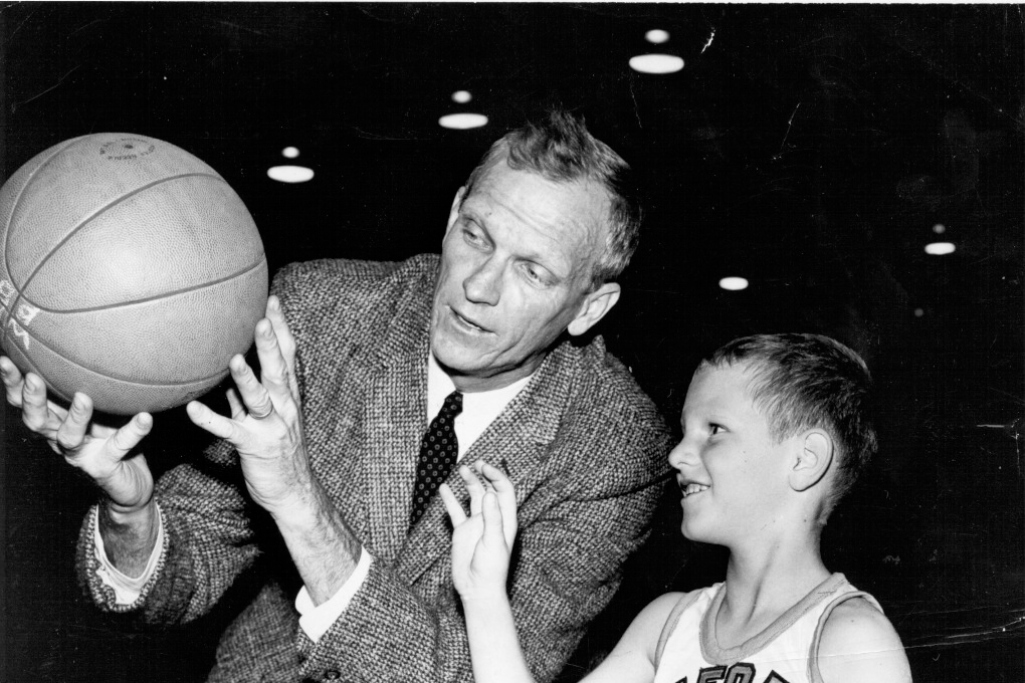
Here in North Carolina, it’s been said that college basketball is its own form of religion. If that’s true, no one has personified that statement like Horace Albert “Bones” McKinney.
McKinney, a championship-winning coach at Wake Forest in the early 1960s, was also an ordained Baptist minister. Even while leading the Demon Deacons on the hardwood, McKinney was a popular and in-demand preacher in local churches across the state.
“You might think that coachin’ and preachin’ don’t mix,” McKinney wrote in his 1988 autobiography Bones: Honk Your Horn If You Love Basketball. “But all coaches have to do a little preachin’ to their players from time to time and most preachers have to coach the members of their congregation, especially before the collection.”
Known for his larger-than-life personality and antics on the sidelines, one former player described McKinney as a blend of evangelist Billy Graham, comedian Bob Hope and boxer Muhammad Ali. And McKinney’s life story is one that could easily have been taken from the pages of a Hollywood script.
Hoop dreams
McKinney was born in 1919 in the tiny community of Lowland in eastern North Carolina near the Pamlico Sound. His family moved to Durham when McKinney was five, and he quickly fell in love with basketball. McKinney starred on legendary Durham high school teams that won 69 consecutive games and three straight state titles.
Although primarily associated with Wake Forest, McKinney actually played for both N.C. State and North Carolina. After graduating from high school in 1940, McKinney played two seasons at N.C. State before being drafted into the U.S. Army and serving in World War II. Following his discharge from the Army, McKinney played one season at North Carolina, leading UNC to the national championship game before falling to Oklahoma A&M.
McKinney also played for legendary coach Red Auerbach during a six-year professional basketball career that included stints with the now defunct Washington Capitols and the Boston Celtics. Near the end of his pro career McKinney’s life took another direction.
“I became a little more serious with my life my last year in the pros,” McKinney wrote. “I had gotten interested in church work and my life was changing. Whatever it meant to be ‘called’ into church work, I was called.”
Coachin’ and preachin’
McKinney enrolled at Southeastern Baptist Theological Seminary in 1952. Now married and with a growing family, McKinney wondered (and prayed about) how he would make ends meet since professional athletes didn’t make the kind of money then that they do now. McKinney wrote that the Lord must have heard his prayers and provided an answer on Nov. 8, 1952.
While sitting in class that morning, Wake Forest basketball coach Murray Greason walked in and asked the professor if he could speak with McKinney. Greason offered McKinney a position as an assistant coach, a role McKinney held for five years until he was promoted to head coach when Greason became Wake’s athletic director.
As head coach, McKinney’s colorful personality was on full display. He became known for his animated sideline antics and exchanges with referees. McKinney even installed a seat belt at his seat on the Wake Forest bench to avoid drawing technical fouls.
McKinney was more than just a showman, however. He took the Wake Forest program to new heights, guiding the Demon Deacons to ACC Tournament titles in 1961 and 1962 and the NCAA Final Four in 1962.
While building Wake Forest into a championship program, McKinney also served as assistant chaplain at the school and continued preaching throughout the state.
“Bones’ reputation around the state was the same as what Billy Graham’s was nationally,” said Billy Packer, a star guard on Wake’s 1962 Final Four team. “Bones was in incredible demand to preach.”
Packer said he would often drive McKinney to many of his preaching engagements on Sundays, sit in the back of the church and be “riveted” by McKinney’s messages.
“He was a phenomenal minister,” Packer said.
Meaningful ministry
The Biblical Recorder, the long-standing N.C. Baptist news journal, highlighted numerous speaking engagements by McKinney at revivals, missions conferences, youth rallies, Baptist associations and state convention meetings throughout the late 1950s and early 1960s.
From August 1959 to August 1960, which coincided with his third season as Wake Forest’s head coach, McKinney served as the interim pastor at Forbush Baptist Church in Yadkinville, which is located about 20 miles west of Winston-Salem. Lifelong Forbush members Kaye Smith and Nancy Carter were teenagers at the time and rooted for the Demon Deacons.
“We were big Wake Forest fans, so it was really exciting for us to have Bones McKinney as pastor of our little country church,” said Carter, who currently serves as church clerk and a member of the historical team.
Smith, who attended several Wake Forest basketball games, said McKinney preached a lot like he coached.
“I remember him waving his arms around a lot like he did on the basketball court,” Smith said. “He was really tall and would often lay over the pulpit to get his points across.”
During his time at Forbush, Life magazine introduced McKinney to a national audience as part of a four-page spread in its Feb. 22, 1960 issue. The photos and accompanying article highlighted McKinney’s roles as a coach, preacher and family man, noting that in the pulpit, “McKinney is more restrained than on the court.”
The article went on to say that “In the pulpit, he dispenses the gospel without ado: just ‘the message’ clear and simple. After listening to his sermons, one parishioner described him as a ‘homely Billy Graham.’”
One of the photos in the Life magazine spread shows a tall, lanky, bespectacled McKinney looming large over the Forbush Baptist Church pulpit with his right arm raised to drive home a point from his message.
Forbush member Maclyn Powell was a little younger than Smith and Carter, but she also remembers McKinney’s time at the church. McKinney baptized Powell, and she joined the church under his ministry.
“My short association with him was a very meaningful part of my life,” Powell said.
Despite McKinney’s competitiveness as a coach and eccentric style, parishioners and former players alike describe him as caring and compassionate.
“Bones was one good human being,” said Alley Hart, a team captain on Wake Forest’s 1961 ACC championship team. “I don’t know of anybody who didn’t like him, except for maybe another coach or two because he used to beat them. He was just a very lovable person.”
When Hart’s father died midway through his junior season in December 1959, McKinney officiated part of the funeral service. Hart says he doesn’t remember much about the service, but he remembers McKinney being there for him.
“After the funeral was over and we came out of the tent, he put his arm around me and walked me to the car,” Hart said. “That’s about all I remember about the funeral, Bones walking me to the car with his arm around me.”
‘Great at two things’
Observers of McKinney’s career at Wake Forest say the dual demands on his time as both a coach and a minister eventually took a toll on him. That fact was foreshadowed in an editorial in the Biblical Recorder after the Demon Deacons qualified for the 1962 Final Four.
“One thing worries us as we watch Wake Forest Coach Bones McKinney agonize his way through a basketball game: How long can he last at this pace?” the editorial read. “On second thought, he probably will last a long time if the Deacons keep winning as they did last week on their way to the NCAA finals. Best of luck to Bones and his fine team at Louisville, Ky., this weekend.”
In the next game after that editorial was penned, Wake Forest fell to Ohio State in the 1962 national semifinals in Louisville. Back then, a consolation game was played at the Final Four. In that contest, McKinney’s Demon Deacons defeated a UCLA team coached by John Wooden, who two years later would win the first of 10 national championships with the Bruins. McKinney’s 1962 squad remains the only Wake Forest team to reach the Final Four in school history.
McKinney retired as Wake Forest’s coach three years later following the 1965 season. He compiled an overall record of 122-94 in eight seasons at the school. He returned to the sidelines to coach the Carolina Cougars of the American Basketball Association from 1969 to 1971 and later served as an analyst on ACC basketball television broadcasts.
McKinney was inducted into the North Carolina Sports Hall of Fame in 1970. He died in 1997 following complications from a stroke.
“What was unfortunate is that he was so great at two things that it just wore him out completely,” Packer said. “The demands on his time were so unbelievable, and the demands were coming from two different directions.”
Had he focused on one thing, Packer said McKinney could have been a long-tenured successful coach like UNC’s Dean Smith or Duke’s Mike Krzyzewski, or he could have been an esteemed minister like Billy Graham.
“He could have been a coach for 20 years had he not been a minister,” Packer said. “And he probably could have been a minister for 40 years had he not been a basketball coach.”
And McKinney’s impact in both arenas is still remembered all across North Carolina.
(EDITOR’S NOTE – Chad Austin serves as content strategist and editor at the Baptist State Convention of North Carolina.)


